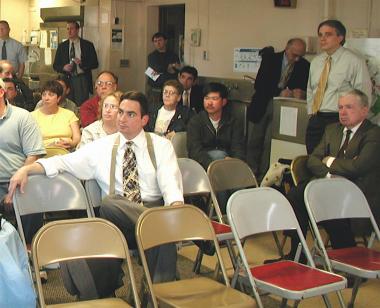It's a new day in Springfield—sort of.
Inauguration ceremonies, like the one held Monday at City Hall, are, by custom, dripping with the rhetoric of change, of new beginnings, fresh starts, glistening opportunities. That rhetoric has particular resonance in Springfield, which, despite the achievements of the last four years, remains, if no longer tottering on the edge of receivership and demoralization, still way too close for comfort. If the past few years have been about saving the city, quite literally, from collapse, the next few will be about securing and building on the fragile progress that has been made.
Leading that effort is Mayor Domenic Sarno, who scored a major upset in November when he unseated two-term incumbent Charlie Ryan. In the months since the election, there's been much speculation about how Ryan lost a race many had assumed he'd handily win. Among supporters, there's been a measurable degree of grumbling that the Ryan campaign had assumed the race was in the bag, and that the mayor could "run on his record," skipping a lot of the usual campaign gestures and focusing on his job.
It's an appealing notion; imagine a world in which politicians' main focus would be on doing the business of the people—not on raising money or schmoozing—and voters would be so connected to the happenings in city government that they would base their decisions on the reality of achievements, not the allure of promises. But sadly, that's not the way electoral politics works, and Ryan, critics and frustrated fans alike contend, should have realized that.
If Ryan eschewed heavy-duty campaigning, Sarno embraced it, to great effect. An eight-year veteran of the City Council, Sarno has always been popular with voters who appreciate his unflagging focus on constituent concerns. Sarno dove into the campaign with an enthusiasm that voters responded to, offering himself as a promising alternative to the doom-and-gloom days that became, fairly or not, associated with the Ryan administration.
So does Sarno represent real change? In the most immediate sense, yes. He'll set his own priorities and forge his own relationships, including replacing Ryan appointees to various city positions and boards with his own people. (It's worth noting, with some trepidation, that Sarno's crowd includes some unwelcome familiar faces associated with the corruption-plagued tenure of Ryan's successor, Mike Albano.)
To a large degree, Sarno, despite his years on the City Council, remains an unknown quantity. Will the new mayor—whom critics charge owes much of his popularity to a scrupulous avoidance of controversy—be willing to challenge "untouchable" big institutions in the city, the way, for instance, Ryan took on the bosses at the Quadrangle? Will the business community that, with a few notable exceptions, supported Ryan, put its faith in Sarno? Will he be able to forge the kinds of relationships at the Statehouse that will get Springfield the support it needs to continue its upward progress, including hammering out a workable repayment plan for the $30 million the city owes the state from the 2004 fiscal bailout package?
And on a purely political level, will Sarno will able to fend off the assaults sure to come from would-be rivals aiming to take his job in two years? Councilors Bud Williams and Jose Tosado are already rumored to have set their caps at the mayor's office, and, his protests notwithstanding, smart money says to keep an eye on Tim Rooke. Whether or not Sarno gets the customary honeymoon period from voters and the local media, it's doubtful his political competition will grant him the same break.
Elsewhere in city government, what change is happening comes pretty much by default. The School Committee's one new member, Chris Collins, is hardly a new face; he's been a principal in the city schools, worked as City Hall's insurance coordinator and—in keeping with the tradition of School Committee members having sticky overlaps with the School Department—is the brother of the head of the teachers' union. (None of which is to say Collins won't be a good addition to the committee, especially in light of the fact that he's filling the seat left vacant by the notoriously do-nothing Jennifer Murphy.)
Likewise, the City Council's one new member, Pat Markey, got there not by kicking out an incumbent but by filling a vacant seat (in this case, Sarno's). Markey, too, comes into office with lots of connections—he was city solicitor, served on the Library Commission and Pension Board and is tight with Ryan—although he looks to be a fine councilor who could shake things up.
For a time, it looked as if the Council might also see a bonus post-election change, when Rosemarie Mazza Moriarty appeared poised to resign to take a job running the School Department's new International Baccalaureate program. That plan hit the rocks after questions were raised about Mazza Moriarty's qualifications. Mazza Moriarty can be, and has been intermittently, a solid councilor, although her tendency to lapse into long periods of dormancy and her fondness for running for other offices (state rep, state senator) suggest her heart's not really in the job. Should she leave, her seat would go to the 10th-place vote-getter in November's election, former councilor Mo Jones.
Jones carries with him considerable baggage; most recently, a developer (of admittedly questionable repute) testified during the Springfield Housing Authority corruption case that he'd paid a $5,000 kickback to Jones, an SHA board member. (Jones has denied the claim and was not charged in the case.) Still, compared to the generally moribund incumbents, Jones could be a lively addition, as evidenced by his campaign trail call (with Rooke) for the city to take by eminent domain the Mason Square library, which had been secretly sold to the Urban League by the then-Springfield Library and Museums Association.?
mturner@valleyadvocate.com



